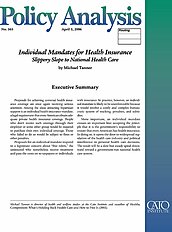Proposals for achieving universal health insurance coverage are once again receiving serious attention. Among the ideas attracting bipartisan support is an individual health insurance mandate, a legal requirement that every American obtain adequate private health insurance coverage. People who don’t receive such coverage through their employer or some other group would be required to purchase their own individual coverage. Those who failed to do so would be subject to fines or other penalties.
Proposals for an individual mandate respond to a legitimate concern about “free riders,” the uninsured who nonetheless receive treatment and pass the costs on to taxpayers or individuals with insurance. In practice, however, an individual mandate is likely to be unenforceable because it would involve a costly and complex bureaucratic system of tracking, penalties, and subsidies.
More important, an individual mandate crosses an important line: accepting the principle that it is the government’s responsibility to ensure that every American has health insurance. In doing so, it opens the door to widespread regulation of the health care industry and political interference in personal health care decisions. The result will be a slow but steady spiral downward toward a government-run national health care system.

This work is licensed under a Creative Commons Attribution-NonCommercial-ShareAlike 4.0 International License.

